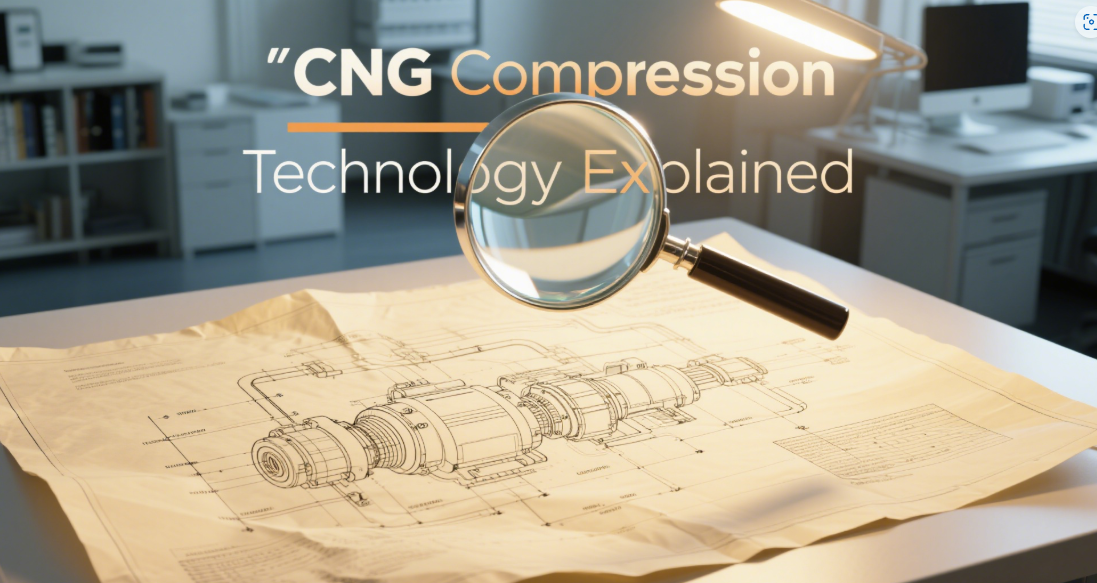As the world seeks cleaner transportation alternatives, Compressed Natural Gas (CNG) has emerged as a vital fuel, offering reduced emissions and often lower costs than traditional gasoline or diesel. However, making natural gas usable as a vehicle fuel involves a critical step: compression. Here at CMN Compressor, we're deeply involved in providing robust and efficient compressor solutions that are the heart of every CNG fueling station.
Understanding the technology behind CNG compressor working principle is key for anyone involved in this growing sector, from station developers to fleet managers. So, let's explore the types of compressors that make CNG a practical reality and the considerations that go into their design and operation.

First, a quick refresher. CNG (Compressed Natural Gas) is simply natural gas (primarily methane, CH4) that has been compressed to a very high pressure, typically between 200 and 250 bar (approximately 3,000 to 3,600 psi).
Why compress it? Natural gas at atmospheric pressure has a very low energy density, meaning it would take up an enormous volume to store enough on a vehicle to provide a practical driving range. By compressing cng compressor, we significantly reduce its volume, allowing a sufficient amount of fuel (by energy content) to be stored in durable onboard tanks. This compression is the essential task performed by specialized CNG compressors. Essentially, the cng compressor working principle relies on a multi-stage process where pistons progressively reduce the gas volume to achieve the high pressures required for efficient storage.
When it comes to achieving the high pressures required for CNG, one type of compressor stands out as the industry standard for fueling stations: the reciprocating piston compressor. The cng compressor working principle involves using pistons within cylinders to sequentially compress natural gas to the high pressures needed for vehicle storage and fueling. At CMN Compressor, we have extensive experience engineering these units for demanding CNG applications. Here’s why cng gas compressors are so well-suited:
High-Pressure Capability: Reciprocating compressors excel at generating very high discharge pressures efficiently.
Multi-Stage Compression: To reach CNG pressures from typical pipeline inlet pressures, compression is done in multiple stages (usually 3 to 5 stages). Each stage incrementally increases the pressure.
Intercooling: Between each stage, intercoolers remove the heat generated during compression. This improves efficiency, reduces the work required for subsequent stages, and protects the compressor components.
Aftercooling: An aftercooler cools the gas after the final stage before it goes to storage or dispensing.
Lubrication Options:
Non-Lubricated (Oil-Free): Many CNG compressors are designed to be non-lubricated in the gas compression cylinders, using specialized piston ring and packing materials (e.g., PTFE-based). This prevents oil contamination of the CNG, which is crucial for modern vehicle fuel systems and catalysts.
Lubricated: Some designs use lubrication, which can offer benefits in terms of wear and sealing, but require highly effective oil separation and filtration systems downstream to ensure CNG purity.
Robustness and Durability: Designed for continuous, heavy-duty operation typical of fueling stations.
Our CNG compressor solutions at CMN Compressor are built on these proven reciprocating principles, optimized for performance and reliability.
While reciprocating piston compressors are dominant for the final, high-pressure stage at fueling stations, it's worth noting a few other related points:
Hydraulic Piston Compressors: This is a specific type of reciprocating compressor where hydraulic fluid is used to drive the gas pistons, rather than a direct crankshaft mechanism. They can offer benefits like effective cooling and sealing, and are sometimes used in smaller or slower-fill CNG station applications.
Upstream Compression: For gathering natural gas from wells or boosting pipeline pressures before it even reaches a local distribution network or a "mother" CNG station, other compressor types like rotary screw or larger reciprocating units might be used. However, these typically don't achieve the final CNG vehicle-fill pressures themselves.
Engineering a CNG compressor involves more than just achieving high pressure. Several critical factors must be addressed:
Safety First: Natural gas is flammable. CNG compressors must be designed with robust safety features, including:
Explosion-proof motors and electrical components (ATEX, IECEx, or equivalent certifications).
Proper ventilation systems.
Gas detection and emergency shutdown (ESD) systems.
Pressure relief valves are at each stage.
Natural Gas Quality: The composition of natural gas can vary, and it may contain moisture or trace impurities. Pre-treatment (like drying and filtering) is often necessary to protect the compressor and ensure the quality of the CNG.
Heat Management: Effective intercooling and aftercooling are non-negotiable to manage the significant heat generated during multi-stage compression of natural gas.
Pulsation and Vibration Control: Reciprocating compressors naturally create pulsations in the gas flow. Pulsation dampeners and proper system design are needed to minimize vibration and stress on piping and components.
Durability and Maintenance: CNG compressors in fueling stations often run for many hours a day. They must be built for durability, and designed for ease of maintenance to minimize downtime.
Efficiency and Operating Costs: Energy consumption is a significant operational cost. Efficient compressor design, VSDs (Variable Speed Drives) where applicable for fluctuating demand, and good system control help minimize these costs.
CNG compressors are the unsung heroes that enable natural gas to be a practical and cleaner alternative fuel for a wide range of vehicles. The technology, predominantly centered around robust multi-stage reciprocating piston designs, has matured to provide reliable and efficient service. At its core, the CNG compressor working principle involves systematically drawing in low-pressure gas, reducing its volume within a cylinder to increase its pressure, and repeating this process across several stages until it reaches the high pressures required for vehicle storage.
At CMN Compressor, we are proud to contribute to the growth of CNG infrastructure by providing high-quality, purpose-built CNG compressors. CMN Compressor understands the specific demands of this application, from achieving high pressures to ensuring uncompromising safety and reliability. If you are involved in a CNG project or have questions about the right compression solution for your natural gas fueling needs, our team of experts is ready to assist you. Let's work together to power a cleaner journey.